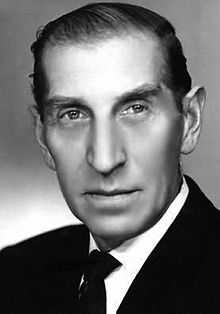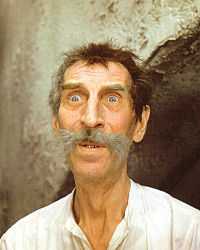Sergey Filippov
| Sergey Nikolayevich Filippov | |
|---|---|
 | |
| Born |
Сергей Николаевич Филиппов June 24, 1912 Saratov, Russian Empire |
| Died |
April 19, 1990 (aged 77) Leningrad, USSR |
| Occupation | actor |
| Years active | 1937 – 1980s |
| Awards | People's Artist of the RSFSR (1974) |
Sergey Nikolayevich Filippov (Серге′й Никола′евич Фили′ппов, June 24, 1912, Saratov, Russian Empire, - April 19, 1990, Leningrad, USSR) was a Soviet film and theatre actor, best known for his parts in films Adventures of Korzinkina (1941), The Night Patrol (1957) and the adaptation of Ilf and Petrov's classic The Twelve Chairs (1971), which granted him the People's Artist of the RSFSR title in 1974.[1][2]
Biography
Sergey Nikolayevich Filippov was born on June 24, 1912, in Saratov. His father was a factory turner, his mother a dressmaker. Expelled from school for bad behaviour (involving, reportedly, dangerous experiments in the cabinet of a chemistry teacher), he tried several jobs (a baker’s boy, a carpenter, a turner) before joining the ballet studio. There the boy has made such an impression that the school's authorities in 1929 sent him to Moscow for further education. Since it was too late to take exams in the Bolshoi's ballet school, Filippov enrolled into the recently formed Popular Music and Circus college which he graduated in 1933 to join the Moscow Ballet and Opera Theatre troupe. Health problems forced Filippov to drop out, though; soon he found himself in the Comedy Theatre, led by Nikolai Akimov, where he soon became one of the leading new actors, noted for his ability to raise a laugh by the simplest of means.[1]
Career in film
In 1937 Sergey Filippov made his debut on big screen, playing a hapless Finnish soldier in For Soviet Motherland. The same year he married Alevtina Grigorovich, fellow Circus college ex-student. 1939-1940 saw Filippov cast in several major movies, playing an enemy saboteur (Zarkhi and Kheifits' Member of the Government), provision store wrecker in Kozintsev and Trauberg's The Vyborg Side, a railroad worker in Arinka by Kosheverova and Muzykant. These, along with the sailor anarchist in Sergey Yutkevich's Yakov Sverdlov, made the actor popular all over the country. Both directors and critics marvelled at Filippov's plasticity, unusual mimic and gesture routine, improvisational talent and physical strength, which allowed him to perform dangerous stunts with relish and ease.[2]
The cultural climate in the late-1941 USSR was hardly good for an eccentric comedy, yet the first Soviet masterpiece of this genre, Klimenty Mints' Adventures of Korzinkina with Yanina Zhejmo in the lead, was hugely successful. Filippov's part (that of a reciter, performing Lermontov's Death of Gladiator on stage, while tormented by a mouse inside his jacket) was small but unforgettable. Film director Sergey Yutkevich in one of his articles called the actor as 'an ideal buffoon'.

In the 1940s Filippov created several vivid characters, mostly crooks, loafers and different kinds of social inadequates. Well-versed in the history of film, he's had his favourite comics, but never copied anybody, looking for some kind of eccentric individuality in every character of his, however small. "I usually play Soviet people, my contemporaries, so in each character I look for a social motif," he said. One of his best-known parts of the time was that of a crooked shop director Polzikov in The Night Patrol. In the early 1950s Grigorovich, his first wife, divorced him; he married Antonina Golubeva, a writer thirteen years his senior.[2]
Mid-1950s saw another rise in Filippov's popularity. His parts were small but strikingly memorable: silly and arrogant Almazov in The Tiger Trainer, absurdly dull Znanie lecturer in Eldar Ryazanov's Carnival Night, two-faced official Komarinsky in The Girl Without Address. Later critics agreed: Filippov's gift has been exploited by directors mercilessly and unadventurously, his very presence saving otherwise mediocre scenes or films. According to actress Lyubov Tishchenko, one of just two people who visited him in his later years, Filippov's major grievance was never having got a tragic role he was craving for. "I even cried as I learned that it was Yuri Nikulin who's got the lead in When the Trees Were Tall", he said.[2]
In 1965 Filippov underwent a brain tumor removal. He continued to work though with the same fervent zeal, though and in 1971 starred as Kisa Vorobyaninov, next to Archil Gomiashvili's Ostap Bender in Leonid Gaiday's highly popular adaptation of Ilf and Petrov's The Twelve Chairs. This proved to be the peak of his career. In 1974 the actor was awarded the People's Artist of the RSFSR title.[2]
In the 1980s Filippov's health started to deteriorate. After Antonina Golubeva's death in 1989 he was left alone, disabled and destitute. He died of lung cancer on April 19, 1990, his body discovered two weeks after death. Lenfilm refused to subside even the meagre funeral service and (according to fellow comedy star Evgeny Morgunov) it was Alexander Demyanenko who collected the sum. Sergey Filippov was buried next to Antonina Golubeva, his second wife, with his favourite poetry line chosen for an epitaph: "And the day of my funeral / Won’t see candles, or hear liturgies".[2]
Filmography
- For Soviet Motherland (Za sovetskuyu Rodinu, 1937, Finnish soldier)
- The Volochyaev Days (Volochayevskiye dni, 1937, partizan)
- The Vyborg Side (Vyborgskaya storona, 1938, storehouse wrecker)
- Arinka (1939, old railroad worker)
- Stanitsa Dalnyaya (1939, a cossack)
- Yakov Sverdlov (1940, sailor anarchist)
- Member of the Government (Tchlen pravitelstva, 1940, a saboteur)
- Musical Story (Muzykalnaya istoriya, 1940, Babashkin)
- Adventures of Korzinkina (Priklyucheniya Korzinkinoi, 1941, fisherman/the reciter
- We Are from Ural (Mui s Urala, 1943, Sergey Stepanovich)
- The New Adventures of Švejk (1943, the German corporal)
- Kashchey Bessmertny (1944, executioner)
- Hello, Moscow! (Zdravstvuy, Moskva, 1945, bayanist Brykin)
- The Busy Estate (Bespokoynoye khozyaistvo, 1946, Krauss, the German spy)
- Cinderella (Zolushka, 1947, the corporal/the fast walker)
- Light Over Russia (Svet nad Rossiyei, 1947, the black market trader)
- Konstantin Zaslonov (1949, Kurt)
- We've Met Somewhere (Mui s vami gde-to vstrechalis, 1954, a man in the atelier)
- The Tiger Trainer (Ukrotitelnitsa tigrov, 1954, Almazov, the tiger tamer)
- The Substitute Player (Zapasnoi igrok, 1954, the jealous husband)
- The Dirk (Kortik, 1954, Filin)
- The Twelfth Night (Dvenadtsataya notch, 1955, Fabian)
- Carnival Night (Karnavalnaya notch, 1956, Nikolayev, the Znanie society lecturer)
- Honeymoon (Medovy mesyats, 1956, the ferry man)
- Different Fates (Raznye sudby, 1956, Kostya, the driver)
- Three Hundred Years Ago (Trista let tomu..., 1956, the monk)
- The Girl Without Address (Devushka bez adresa, 1957, Komarinsky, the head of the office)
- The Night Patrol (Notchnoi patrul, 1957, Polzikov, the shop director)
- The Street Full Of Surprises (Ulitsa polna neoznidannostei, 1957, the militia man)
- The Storm (1957, Vilentchuk)
- The Friend (Druzhok, 1957, the crook)
- The Girl With Guitar (Devushka s gitaroi, 1958, the dogs trainer)
- On the Other Side (Po tu storonu, 1958, Maiba)
- Oleko Dundich (1958, the White army man)
- Chauffer by Default (Shofyor ponevole, 1858, Savrasov, the driver)
- The Unyielding Ones (Nepoddayushchiesya, 1959, the militia man)
- Rather Than 100 Rubles (Ne imei sto rublei, 1959, the hotel administrator)
- Beware, the Babushka! (Ostorozno, babushka, 1960, the forrester)
- The Devil Dozen (Tchortova dyuzhina, 1961, the passenger)
- The Main Road (Bolshaya doroga, 1962, the town mayor)
- Tcheryomushki (1962, Mylkin, the neighbour)
- The Serf Actress (Krepostnaya aktrisa, Eppidifor, the house manager)
- The Little Hare (Zaitchik, 1964, theatre director)
- The Adventures of Tolya Klyukvin (Priklyutcheniya Toli Klyukvina, 1964, the house council accountant)
- The Foreign Woman (Inostranka, 1965, Abdulla)
- The Sleeping Lion (Spyashchi lev, 1965, the deputy director)
- The Kookie (Stryapukha, 1965, the market crook)
- The Last of the Crooks (Posledny zhulik, 1966, the warden)
- Beware of the Car (Beregis avtomobilya, 1966, the audience member)
- The New Adventures of the Elusive Avengers (Novye priklyucheniya neulovimykh, 1968, Koshkin, the apothecary)
- The Snow Maiden (Snegurotchka, 1968, Bermyata)
- Don’t You Sulk! (Ne Goryui!, 1968, hairdresser)
- The Old Acquaintance (Stary znakomy, 1969, lecturer Nikodimov)
- The Twelve Chairs (Dvenadtsat stulyev, 1971, Ippolit Matveevich Vorobyaninov)
- The 12 Surprises (Dvenadtsat neozhidannostey, 1971, Dima Kurochkin)
- The Shadow (Tenh, 1971, the First Minister)
- The Big Amber (Bolshoi yantar, 1971, the orchestra conductor)
- Tobacco Captain (Tabachny kapitan, 1972, Karpiy Smurov, the merchant)
- Have You Loved Somebody? (A vy lyubili kogda-nibud?, 1973, doctor Mikhail Mikhaylovich/Olga Vasylievna)
- Ivan Vasilievich Changes His Profession (Ivan Vasilyevich menyaet professiyu, 1973, the Swedish ambassador)
- Tsarevich Prosha (1974, ataman)
- This Cannot Be! (Ne mozhet byt, 1975, singer at the wedding)
- Au-u! (1975, King Ababua)
- Apples As Usual (Yabloko kak yabloko, 1975, the specialist)
- The Funny Dream or Laughter Through Tears (Vesyoloye snovidenie ili Smekh skvoz slyozy, 1976, Unuilio VII, the Chess King)
- Songs Under Clouds (Pesni nad oblakami, 1976, the brigadier)
- Ivanushka the Fool in Search of a Miracle (Kak Ivanushka-durachok za tchudom khodil, 1976, the foreign healer)
- The Blocade (Blokada, 1977, Vasily Gubarev)
- Incognito from Saint Petersburg (Inkignito iz Peterburga, 1977, Osip)
- Die Fledermaus (Letuchaya mysh, 1979, the forrester)
- To Buy Some Matches (Za spitchkami, 1980, Khuvyarinen)
- The Comedy of Days Long Past (Komediya davno minuvshikh dnei, 1980, Kisa Vorobyaninov, lecturer Nekadilov)
- The Mystery Old Man (Tainstvenny starik, 1980, Tchikildeev)
- Where’s Fomenko Gone? (Kuda ischez Fomenko?, 1981, Alina’s father)
- In Rhythms of Old (V starykh ritmakh, 1982, the chief criminal police inspector)
- The Donkey Hyde (Oslinaya shkura, 1982, the court man)
- 'Sportloto-82 (1982, the station chief)
- And Then Came Bumbo (I vot prishol Bumbo, 1984, schprechstalmeister)
- The Tale of a House-Painter in Love (Skazka pro vlyublyonnovo malyara, 1987, the chief wiseman)
- Heart of a Dog (Sobachye serdtse, 1988, Professor Preobrazhensky's patient)
References
| Wikimedia Commons has media related to Sergey Filippov. |
- ↑ 1.0 1.1 "Filippov, Sergey Nikolayevich". www.kino-teatr.ru. Retrieved 2012-03-01.
- ↑ 2.0 2.1 2.2 2.3 2.4 2.5 "Filippov, Sergey Nikolayevich". www.rusactors.ru. Retrieved 2012-03-01.